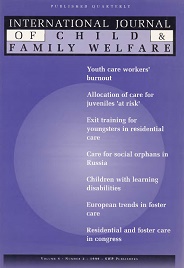Behavioral problems and socio-emotional well-being of children with learning disabilities in regular and special primary school
Abstract
Learning disabilities and behavioral problems for a long time have been studied as relatively separate phenomena. Despite clinical evidence, little or no attention was paid to the relationship of both problem areas. Recent empirical research indicates that there is a certain comorbidity of both problem domains. The nature of the relationship, however, stays relatively vague. We find a number of factors that influence the interaction of both developmental aspects and observe an evolution from exclusive attention to child-oriented variables to involving social context variables. Among the child variables the cognitive and metacognitive functioning takes a central position. Self-esteem, attribution of success and failure, expectation of success and failure, and self-regulation turn out to influence to an important degree the relationship between learning and behavioral problems. Among the social context variables the school setting is an important factor. In this article, we present the results of our own research on this topic.

